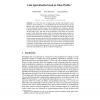Free Online Productivity Tools
i2Speak
i2Symbol
i2OCR
iTex2Img
iWeb2Print
iWeb2Shot
i2Type
iPdf2Split
iPdf2Merge
i2Bopomofo
i2Arabic
i2Style
i2Image
i2PDF
iLatex2Rtf
Sci2ools
SAS
2000
Springer
2000
Springer
Code Specialization Based on Value Profiles
Abstract. It is often the case at runtime that variables and registers in programs are "quasi-invariant," i.e., the distribution of the values they take on is very skewed, with a small number of values occurring most of the time. Knowledge of such frequently occurring values can be exploited by a compiler to generate code that optimizes for the common cases without sacrificing the ability to handle the general case. The idea can be generalized to the notion of expression profiles, which profile the runtime values of arbitrary expressions and can permit optimizations that may not be possible using simple value profiles. Since this
Related Content
| Added | 25 Aug 2010 |
| Updated | 25 Aug 2010 |
| Type | Conference |
| Year | 2000 |
| Where | SAS |
| Authors | Robert Muth, Scott A. Watterson, Saumya K. Debray |
Comments (0)

